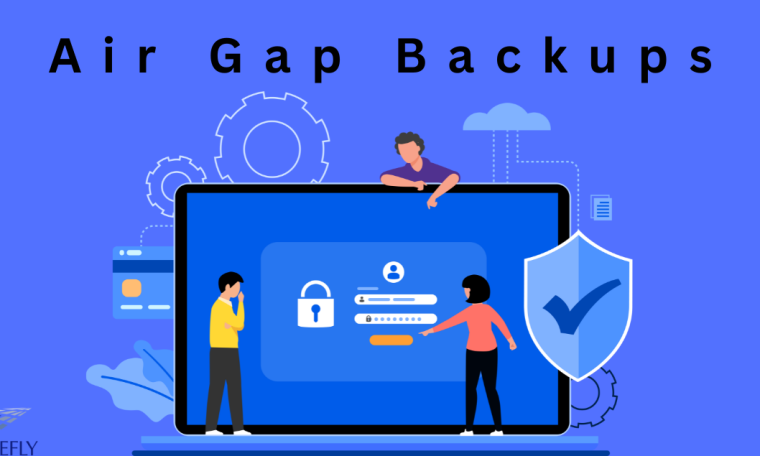
The Crucial Role of Air-Gap Backups in the Digital Age
In a world where data breaches and cyber threats have become almost as common as our morning coffee, there is a digital bulwark that stands as a sentinel between our most valuable information and the malfeasance of the web. Enter the Air-Gap Backups, a humble term that carries the weight of entire organizations’ security strategy. As a staunch advocate for data protection, I find it imperative to champion the oft-underappreciated but highly effective methodology of air gap backups.
Understanding Air-Gap Backups
An air gap backup is an offline backup system where the backup copy of a data set is not accessible from the network. This can mean physically isolating the backup storage or maintaining a network that is not interconnected with the internet or other external networks. The rationale is straightforward – if the backup is not accessible, it cannot be tampered with. This makes air gap backups the holy grail when it comes to data protection and recovery.
The necessity for air gap systems has been made painfully clear by the staggering rise in ransomware attacks, where hackers gain access to a system and encrypt data, demanding a ransom for its release. With an air gap backup, even if the primary system is compromised, the backup remains intact and recoverable, shining a light in the darkest times of a cybersecurity incident.
Benefits of Air Gap Backups
Data Protection Against Cyberattacks
Cybersecurity is not about if, but when, a breach occurs. Air gap backups offer a layer of protection that is virtually impenetrable, significantly reducing the risk of data loss. Since the backup is offline, there is no direct or remote access for cybercriminals to exploit, ensuring that critical data is secure and restorable in the event of an attack.
Ensuring Data Integrity and Availability
For businesses, data integrity is non-negotiable. A single instance of data corruption can lead to significant financial and reputational damage. Air gap backups provide a reliable means to ensure that data remains uncorrupted, as the isolation from the primary network prevents propagation of corruption. This, alongside the ease of access to historical data and the ability to recover quickly, makes air gap backups the gold standard for data availability.
Regulatory Compliance
In this age of strict data privacy regulations, maintaining compliance is critical for businesses. Many regulatory bodies require the implementation of air gap backups as a precaution against data loss and cyberattacks. By utilizing this backup method, organizations can meet regulatory requirements and avoid hefty fines or legal implications.
Protection Against Natural Disasters
While it may be tempting to rely on cloud-based backups for disaster recovery, they are not immune to outages or failures. Air gap backups offer an additional layer of protection in the event of a natural disaster, ensuring that data remains secure and recoverable even if other backup methods fail.
Cost-Effective Solution
Contrary to popular belief, air gap backups can be more cost-effective than other backup solutions in the long run. While the initial investment may be higher, the lack of ongoing expenses such as network maintenance and cloud storage fees make air gap backups a financially viable option for businesses.
Prevention of Insider Threats
Data breaches are not always caused by external attackers – insider threats can be just as damaging. Air gap backups provide protection against malicious insiders who may attempt to tamper with or delete critical data. By limiting access to the backup, organizations can safeguard against both external and internal threats.
Flexibility in Data Storage
Air gap backups offer flexibility in storage options, allowing businesses to choose the most suitable method for their needs. This can include physical Backups such as tapes or hard drives, or even utilizing a separate network that is not connected to the internet. This flexibility ensures that businesses can tailor their backup strategy to their unique requirements.
Peace of Mind
Last but not least, air gap backups provide peace of mind for organizations and individuals alike. In the digital age where cyber threats are ever-evolving, having a secure and reliable backup method is essential for ensuring the safety and accessibility of critical data.
Challenges and Considerations
Implementing Air Gap Backups Effectively
The challenge with air gap backups lies in their implementation. A comprehensive strategy must consider the frequency of backups, how to store and update them, and the cost of maintaining these systems. Moreover, creating a seamless process for retrieving and updating air gap backups is vital, as human error can be just as perilous as malicious intent.
Balancing Convenience and Security
An oft-raised concern with air gap backups is the trade-off between security and convenience. While the latter is appreciated in our fast-paced digital landscape, there is no substitute for security when it comes to the loss of sensitive or critical data. Organizations must, therefore, strike the right balance, implementing air gap backups without hindering the efficiency of operations.
Personal Reflection
In my professional career, I’ve seen the devastating impact of unchecked cyber threats. Organizations, both large and small, have fallen victim to the growing sophistication of digital attacks, often lamenting that they wish they had taken the necessary precautions, including bolstering their backup strategies. This has reinforced my belief in the efficacy of air gap backups.
They are not only my recommended choice but the foundational pillar of a resilient data security architecture. For me, the minor inconvenience of offline backups pales in comparison to the peace of mind that comes with knowing my data is secure, restorable, and unassailable.
Conclusion
The shift to digital transformation is accelerating, and with it, the risks and challenges associated with cybersecurity. Air gap backups are not a relic of a past era but a critical, innovative solution that is more relevant today than ever. I implore organizations to reevaluate their backup and recovery strategies, ensuring that they are prepare for any eventuality. The time for passive security measures has passed, and the age of the air gap is at hand. It’s time to breathe in the security of the digital air.
FAQs
Q: How often should air gap backups be performed?
A: The frequency of air gap backups depends on the specific needs and data volume of an organization.
Q: Can air gap backups still be access in case of a disaster?
A: Yes, air gap backups can be access in the event of a disaster as long as they are store in a secure location that is not affect by the disaster. This could include off-site storage facilities or utilizing physically separate networks.
Q: Are there any alternatives to air gap backups?
A: While air gap backups offer robust protection, there are other backup strategies such as cloud-based backups, replication, and mirroring. It is recommend to have a combination of backup methods for comprehensive data protection. However, air gap backups remain the gold standard for ultimate data availability and security. So while alternatives exist, they may not offer the same level of protection and peace of mind as air gap backups do.
Q: Can individuals also utilize air gap backups?
A: Yes, individuals can also utilize air gap backups to protect their personal data. This could include important documents, photos, or other sensitive information that they want to ensure is secure and accessible in the event of a disaster. Though it may require some additional setup and maintenance, it can provide great peace of mind for individuals as well.
Q: Is there a specific industry that can benefit the most from air gap backups?
A: Air gap backups are beneficial for any industry, as all organizations face the risk of cyber threats and data loss. However, industries that handle highly sensitive information, such as healthcare, finance, and government agencies, may have even greater potential benefits from implementing air gap backups due to the nature of their data and the regulatory requirements they must comply with.



